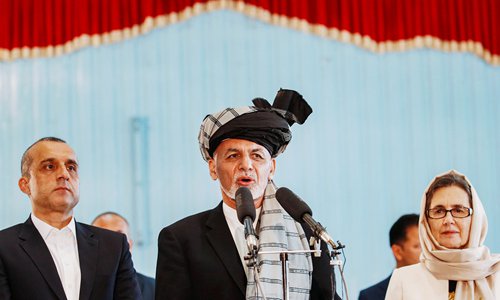HOME >> WORLD
Afghan voters head to polls amid deadly violence
Source:AFP Published: 2019/9/28 22:53:40

Afghan Presiden Ashraf Ghani speaks after casting his vote in the presidential election in Kabul, Afghanistan on Saturday. Photo: VCG
Afghans voted in presidential elections amid tight security Saturday, even as insurgents attacked polling centres in a series of blasts and clashes across the country that left at least two people dead.The first-round vote marked the culmination of a bloody election campaign that despite a large field of candidates is seen as a close race between President Ashraf Ghani and his bitter rival Abdullah Abdullah, the country's chief executive.
Wary authorities placed an uneasy Kabul under partial lockdown, flooding streets with troops and banning trucks from entering the city in an effort to stop would-be suicide bombers targeting residents as they cast their votes.
Polls closed at 5:00 pm (12:30 GMT) after a two-hour extension due to long queues of people still waiting to vote, the Independent Election Commission said.
Compared to previous elections, the initial toll appeared relatively light, though authorities provided little information about reported blasts and ongoing armed clashes with the Taliban in various provinces.
A security official who requested anonymity told AFP that two civilians had been killed and 27 wounded in Taliban bombings and mortar attacks at polling centers across the country.
Serious security incidents were reported in several provinces including Kunduz, Nangarhar, Kabul, Bamiyan and Kandahar.
The Taliban, who unleashed a string of bombings during the two-month election campaign, claimed to have conducted hundreds of attacks against Afghanistan's "fake elections."
Some 9.6 million Afghans are registered to vote, but many lack faith that after 18 years of war any leader can unify the fractious country and improve basic living conditions, boost the stagnating economy or bolster security.
Observers from the Afghanistan Independent Human Rights Commission said turnout appeared to be low, especially among women.
Posted in: ASIA-PACIFIC